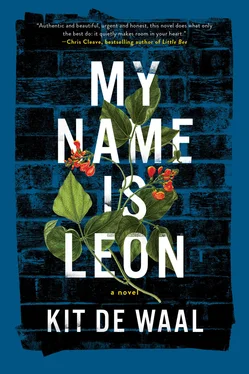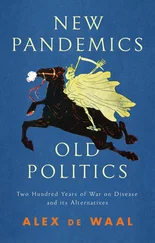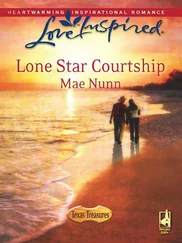After the battleship, Maureen buys twoice creams and they walk a long way through loads of people, get on a bus and off by the train station. They’re much too early for their train so they have to wait on another bench until it comes. Eventually, they’re sitting opposite each other in the carriage, a beige plastic table between them, jutting into Maureen’s belly.
“Snack?” says Maureen, pulling out a bar of chocolate. She breaks off two small pieces and pushes the rest across the table. Leon can’t believe how many treats she brought with her and how she isn’t telling him off for eating them. He’s had a toothache all day and the sweets make it worse but he still takes the chocolate. As it melts, he presses his tongue against the molar at the back and the pain becomes nice pain and slinks off to the back of his mind with all the things he doesn’t want to remember.
“Something I’ve been meaning to tell you,” says Maureen.
Leon looks out of the window. They’re passing the backs of houses, graffiti on walls, skinny trees growing out of concrete, underwear and vests strung up in gardens, paddling pools, abandoned fridges, scrubland, old factories, houses again. He wonders what it would be like to live so close to a train station or a train track and, if he lived in one of those tall, narrow houses, whether or not he could run to the end of the garden, climb over the fence, and jump on to the train as it sped past, and he thinks again about running away, riding on the roofs of the carriages with his backpack.
“You listening?” she says.
Leon nods and Maureen leans forward.
“You are not going anywhere,” she says and she says it slowly, like he’s five years old.
“You’re staying with me,” she repeats, with her heavy chest flat on the table.
“At the seaside?”
“Leon,” says Maureen with a little shake of her head, “I’ll tell you what the danger is in hearing half a conversation.”
She waits for him to say something so he says, “Yes.”
“You’re likely to jump to conclusions. Know what that means?”
“Being wrong.”
“Exactly. I’m not going to the seaside. Sylvia’s not going to the seaside. You’re not going to the seaside. I’m not getting a bloody dog. Do you believe me?”
“Yes.”
“So, for the tenth time, we are not going to the seaside. Except for a day trip maybe.”
“When?”
“I don’t know when.”
She leans back in her seat and goes quiet. Leon sees right inside her head. He sees her thinking of what to say to him and it’s going to be something bad, because she looks like she’s going to cry again, and he’s sick of ladies crying all the time. He only cries when things are bad but they cry all the time, sometimes for ages, and their lips go fat and their faces go blotchy. But this time, Maureen’s tears don’t come out. Instead she looks at him and winks.
“When I was your age, well, fifteen actually, I broke my arm and I had it in plaster for the longest time. It was summer vacation. We had the school playing fields at the bottom of our garden and I used to be a bit of a tomboy — yes, use your imagination, Leon. I would climb over the railings, kick the sand out of the box where they did the long jump, bend the branches off the trees, and try to break in. Couldn’t wait to get out the place when it was open. I was always on my own, up to no good. Anyway, I broke my arm swinging from a tree, fell over, landed funny. God, it was bloody itchy in the heat. I used to get my mom’s knitting needles and shove it down the gap and scratch it but I couldn’t quite get the right spot. Know what I mean? I couldn’t quite reach the right place and I would squirm and wriggle, trying to get a bit of relief. Sylvia used to have to help — sometimes she would knock on the plaster but that would hurt as well. Used to make me cry sometimes with the frustration of it and the pain and the way I was trapped in this bloody plaster of paris and I couldn’t go out exploring and, oh, I know it seems like nothing to you but I was so unhappy. I hated that summer. Hated it.”
“Yes,” says Leon.
“What I’m trying to say is this, Leon. And that was a bad example but never mind. This isn’t the whole of your life, love. This is a bit of your life. It all seems bloody awful, I know, with your mom and Jake and…”
She takes a tissue out of her handbag and puts it in his hand. She undoes a family bag of Mint Imperials and tips a handful on the table and they roll all over the place.
“The thing is this and you have to believe me. I’ve made arrangements with the Social. I’ve been working on this for weeks but I didn’t want to tell you until it was official. It’s taken forever to get it all organized. So, the point is, you’ll be with me until you leave school and even after, if you like. I get you. You get me. That’s the deal. But it’s got strings attached. Do you know what that means?”
“Yes.”
“What?”
“It’s got to be tied up.”
“No. Well, yes. It means that to tie the deal up, to make it a proper thing that you can’t undo, you have to make a promise to me. And if you make the promise you can’t go back on it. Two promises, actually, Leon.”
“Yes.”
“Wipe your face.”
She sniffs and holds two fingers up but not the swearing ones.
“One,” she says, “you have to tell me when something’s wrong. Don’t matter what it is and it don’t matter if it’s me that’s done it. And I’m not saying I can fix it, because I can’t fix everything. I’m not a magician, am I?”
“No.”
“Second, don’t run away.”
“Yes.”
“Sorry?”
“I won’t.”
“Good. That’s a deal then.”
“Yes.”
“No more sweets for a week. Not for me and not for you. We’ve gone overboard today and I get weighed tomorrow.”
She pinches the fat on the top of her arms.
“Shit.”
On the day of the Royal Wedding, Mr. Devlin comes by really early in the morning. He rings the bell before Sylvia and Maureen are out of bed, so Leon has to run to the door.
“Good,” he says, “someone’s awake at least.”
He walks in and puts the kettle on.
“Sylvia said come early,” says Mr. Devlin and Leon runs and knocks on Sylvia’s door, opens it an inch.
“Sylvia,” he says, “he’s here.”
“Victor? Shit, shit, shit…” she hisses. “Ten minutes.”
Leon runs back to the kitchen.
“So,” Mr. Devlin says. “We’ve got a lot to do for your party.”
“It’s not my party,” says Leon.
“It’s not mine, either,” he replies. “She is not my queen, he is not my prince. I don’t believe in royal anything.”
“Why not?”
“That’s a long and complicated explanation and I haven’t had my coffee yet.”
Leon takes a mug out of the cupboard and shows Mr. Devlin where the coffee is. Sylvia always makes Mr. Devlin’s coffee, so she won’t mind. Leon takes a bowl for himself and sprinkles his cornflakes in.
“Is your queen in Ireland?” he asks.
Leon needs to be at the sugar stage before Sylvia comes into the kitchen and catches him. Mr. Devlin leans on the kitchen counter and folds his arms.
“There are no kings or queens, Leon. There are people. This marriage is a marriage between two people, a man and a woman, nothing more. Maybe they love each other, maybe they don’t, but it is not a fairy tale. It is a wedding. And today we’re making a wedding party, a celebration for people who believe in witches and wizards and princesses rescued from towers.”
“Are you still coming?”
“Yes.”
“Why?”
“Because I was invited,” he says and nods at Sylvia, who is standing in the doorway pulling the belt on her dressing gown.
Читать дальше












